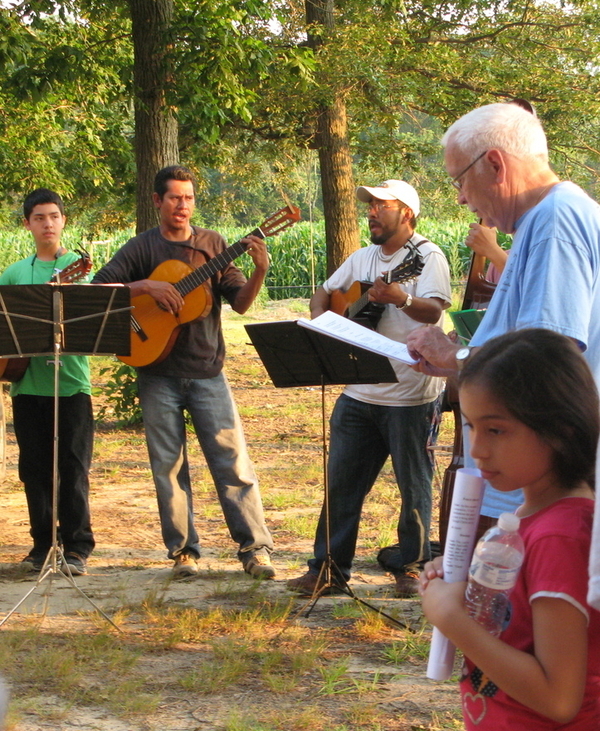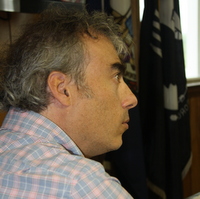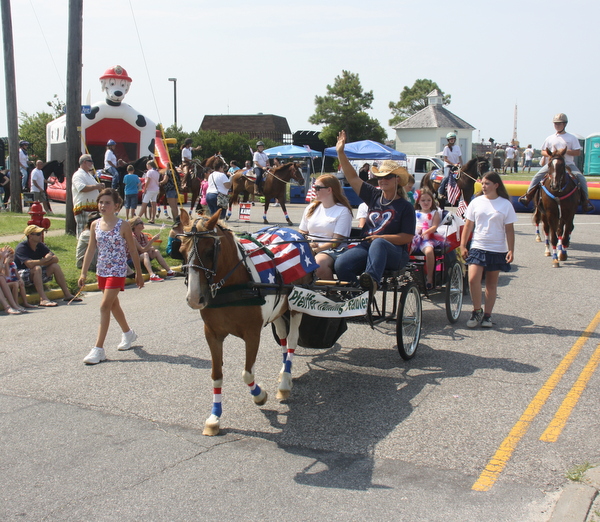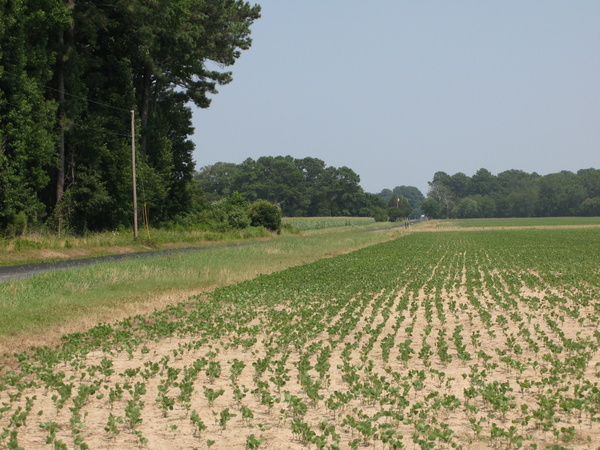Once-Wealthy Volunteer Ministering to Migrant Workers

The Angels, a local family of musicians, assisted by St. Charles Catholic Church volunteers, at an outdoor Mass for migrant workers and their families.
By KAREN JOLLY DAVIS
Cape Charles Wave
July 12, 2012
Hector Amortegui and his wealthy family fled their home in Bogota, Colombia, after they were threatened by guerilla fighters. Now he’s on the Eastern Shore for a third summer, ministering to migrant farmworkers and encouraging local people to have compassion on them.
“The people have been the ones that made me love this place,” Amortegui said about the Eastern Shore, and parishioners at St. Charles Catholic Church. “They are so transparent, loyal and loving.”
Amortegui didn’t speak a word of English in 2008 when he arrived at St. John Vianney Seminary in Miami. Now he translates the Mass into Spanish during the priest’s visits to Northampton County migrant camps. He organizes the collection and distribution of donated items, keeps an eye open for trouble, transports people to healthcare, and coordinates the local volunteers.
“It would be hard to do it without him,” said Chris Bannon, one of the St. Charles volunteers. “We come in with the fluff but don’t have the ability to touch the people. Our ministry would limp without him.”
The Eastern Shore has the highest density of migrant farmworkers in Virginia. Sixteen years ago, there were five tomato-growing companies and 120 camps accommodating 5,000-6,000 workers and family members.
Last year, there were only three growers and 50 camps.
This year, only two agribusinesses have planted tomatoes — Kuzzens/6Ls, and Pacific Tomato Growers — with 1,800 farmworkers in 25 camps. Pacific Tomato Growers does not house children, forcing workers to either look for housing in the community, or leave their families behind.
Jim Albright, coordinator of migrant ministries for the Catholic Diocese of Richmond, says the situation is unjust. “If we need their sweat so badly, and we rely on foreign labor, then we ought to welcome them into our society and let them bring their families,” he said. “Otherwise they become just a tool.”
Albright recruited Amortegui at the Miami seminary in 2010. By then, he was studying English five hours a day. He said he learned easily because, having studied as a youth in a Jesuit school, he had a good background in Spanish, French, and Latin grammar. His father is a judge and his mother a professor of philosophy.
Planning Commission Sets Another Public Hearing to Rezone Old School Property

Echelon Resources developer David McCormack meets publicly for first time with Town officials and residents.
By DORIE SOUTHERN
Cape Charles Wave
July 11, 2012
The Cape Charles Planning Commission voted last night to schedule further public hearings to consider rezoning Central Park’s old school building, basketball court, and parking lot from “Open Space” to “R-1” (single family residential).
Simultaneously, the Planning Commission will conduct a hearing for a special use permit to allow conversion of the school to a 17-unit apartment building.
Several public hearings have already been held, but residents, backed by an attorney, have pointed out a number of deficiencies in the process, leading the Town to schedule further hearings.
For example, the April 3 public hearing occurred without required notification to adjacent property owners.
Some dozen persons came to the meeting last night to object to rezoning the property. Only Bob Panek, the Assistant Town Manager (who explained that he was speaking in his private capacity), endorsed the project.
Odessa Sullivan said that “the town has not inspired trust that procedures are being followed.”
Debra Bender noted that the Town’s 2009 Comprehensive Plan calls for public space for public needs. “This plan would take away parking for the children’s playground. As a grandmother I use the parking to take my grandson to the park on a regular basis.”
Wayne Creed, president of Old School Cape Charles, LLC, said, “Town Council has ignored the advice of the Town attorney, who said there should be a buyback option and a performance bond. The developer scuttled our high-paid attorney’s advice.”
George Southern claimed the Conditional Use Permit application was “fraudulent,” because it contained a signed statement representing the owner of the property as Echelon Resources, when in fact the Town is the owner. The application also claimed to contain a “disclosure statement signed and notarized verifying ownership,” which was lacking. He also said no required survey had been done to determine where the property would be subdivided between the playground and the apartment building.
Newly elected Councilman Frank Wendell drew attention to extensive email correspondence between the Echelon Resources developers and Town staff members Bob Panek and Town Manager Heather Arcos, which was obtained through a Freedom of Information Act request. Wendell took umbrage over Echelon’s Edwin Gaskin’s characterization of opponents of the development as the “idiots of the world.”
Wendell also contrasted the lack of requirements by the Town on Echelon Resources compared to those expected of Old School Cape Charles.
Following the meeting, Echelon developer McCormack spoke informally with residents. Some of them expressed unhappiness that the negotiations over the property had been done in secret, and that Town Council had refused to entertain other proposals and petitions. “You may be venting on me when I’m not the bad guy,” McCormack said.
SHORE THING: My ‘Macaca’ Moment
By GEORGE SOUTHERN
Cape Charles Wave
July 11, 2012
Mention the word “Macaca,” and millions of people will vaguely recall it had something to do with a politician turning his attention toward a college student who was videotaping every word he said.
That politician was George Allen, and July 11 marks exactly 5 years and 11 months since Allen infamously nicknamed the student videographer from UVA (who is of Indian descent) “Macaca” — a kind of monkey. Commentators blame that 1-minute indiscretion for Allen’s loss to now-Senator James Webb. You can relive it here:
Last night I had my own “Macaca” moment – nothing dramatic like the Allen episode, but nevertheless I felt a little like that UVA student, S.R. Sidarth, as he stood filming a speaker who suddenly directed everyone’s attention to the cameraman.
I was attending a meeting of the Cape Charles Planning Commission, and the commissioners were hearing a presentation by Echelon Resources developer J. David McCormack. As everyone in Cape Charles knows, Mayor Dora Sullivan has signed a contract to sell the old school, playground parking lot, and basketball court to Echelon Resources for the sum of $10.
Last night was the first time that a representative of Echelon Resources has spoken publicly about the deal, and I was filming it.
McCormack began by mentioning the friendship between his wife and Town Manager Heather Arcos. His wife is from Nassawadox, and “just by sheer coincidence,” McCormack said, “we realized that we had – she had a relationship with Heather.”
“That’s really as far as it goes,” McCormack concluded.
And then the presentation began – at least for several seconds — before Planning Commissioner Malcolm Hayward asked, “Are you fine with this camera?”
And then, for a few fleeting seconds it was all about George. “I’m happy to meet George . . . I got a lot of emails from George via Edwin [Gaskin, his Echelon partner] over the last couple months . . . I’m happy to hear from George, glad to meet George,” McCormack said, facing the cameraman (me).
“Whatever happens with the school at the end of the day, I’m going to still be neighbors with you all – by virtue of my relationships in town,” McCormack explained. [Read more…]
Samuel R. Norman, 1941-2012
 Samuel R. Norman, 70, longtime Ashland, New Hampshire, resident, died at home July 8, 2012, following a period of declining health.
Samuel R. Norman, 70, longtime Ashland, New Hampshire, resident, died at home July 8, 2012, following a period of declining health.
He was born Oct. 11, 1941, in Richmond, Va., the son of William S. and Dorothy (Routt) Norman.
He and his family lived in Cape Charles, Va., for many years, coming to Ashland in 1948 when he was 6 years old. He attended Ashland schools, retired in 1976 from the U.S. Air Force, and was a graduate of Plymouth State College.
In 1978 Sam was married to his wife of 33 years, Sherry Fields Norman. [Read more…]
2,000 Migrant Workers Missing from Local Economy;
Tomato Fields Not Planted
By KAREN JOLLY DAVIS
Cape Charles Wave
July 10, 2012
One family’s troubles echo through the entire community. At least, so it seems on Virginia’s Eastern Shore, where East Coast Brokers and Packers have not planted tomatoes and more than 2,000 workers who normally would live here in the summer are not coming.
“They contribute to this economy,” said Jim Albright, regional coordinator for Justice and Peace for the Catholic Diocese of Richmond, about the missing migrant farmworkers.
Tomato pickers buy food, gas and supplies locally, said Albright. They patronize laundromats, fast food restaurants and auto repair shops. Employees of at least 12 state, federal and county organizations spend part or all of their time working with migrants—which translates into local jobs. Farmworkers pay sales taxes — and all state and federal taxes are withheld from their pay checks, including social security payments.
“They’re not being paid under the table,” said Albright.
The local trouble started in Florida, focused on the family of Batista J. Madonia Sr. Madonia Sr.—a sometime Cape Charles resident–and his family own several companies, including East Coast Brokers and Packers, Stellaro Bay, Inc., and the Circle M Ranch in Lakeland, Florida.
According to the Tampa Tribune, the Madonias are known in Florida for their generosity. In his book, Tomatoland, Barry Estabrook says East Coast Brokers and Packers quit the powerful Florida Tomato Growers Exchange in the fall of 2009, and partnered with a group called the Coalition of Immokalee Workers.
In September of 2009, the Modonias convinced their client, Compass Group North America, to pay 1.5 cents per pound extra for their tomatoes, with 1 cent per pound passed directly to the field workers.
”Although it was probably not the most popular decision, it was a decision we chose to make for our workers and for our partners in business,” Madonia Jr. said in The Packer, a fresh produce industry newsletter. “If there’s a way I can give them (the workers) a better standard of living, they can have a better life and if this doesn’t adversely affect my business at all, there’s no way I could not let this happen.” [Read more…]
More July 4th Parade and Raffle Winners Discovered
They say that news travels fast on the Eastern Shore, but nevertheless it took five days to learn the winners of the two final categories in the Cape Charles July 4th Parade.
“Best Novelty Entry” was won by the Old School Cape Charles group, represented in the top photo by (from left) Katie Wendell, Frank Wendell, and Tommy Godwin.
“Best Equestrian Group” was Pfeiffer Training Stables, shown in the bottom photo.
See our other stories for the rest of the parade winners.
Winners of the New Roots Youth Garden’s July 4th raffle were:
1st prize ($500) – Stuart Smith (Cape Charles)
2nd prize ($250) – Frank Yerabek (Smithfield)
3rd prize ($100) – Bob Panek (Cape Charles)
We’re still waiting for the results of the Golf Cart raffle . . . . 

Correction: Planning Commission Meeting is Tuesday, July 10
The July 9 story, “Developer Applies to Convert Old School to Apartments,” inadvertently gave the date of the Planning Commission’s next meeting as June 10. The correct date is Tuesday, July 10. The Wave regrets the error.
Developer Applies to Convert Old School to Apartments

Developer plans to convert playground parking to private use, requiring Town to close this entrance to the playground.
By DORIE SOUTHERN
Cape Charles Wave
July 9, 2012
The Town of Cape Charles has made public an application by Echelon Resources, Inc., for a Conditional Use Permit to, according to Town Planner Tom Bonadeo, “rehabilitate the Old School Area and convert it to 17 residential apartment units and surrounding grounds.”
The “surrounding grounds” include the basketball court and the parking area currently used by persons accessing the park and adjoining children’s playground.
If the Echelon Resources request is approved, there will no longer be any public parking for Central Park other than on the street.
The current basketball court will become a parking lot, but the developer has made clear that the parking lot will be off-limits to the public.
On March 29, Echelon Resources President Edwin Gaskin wrote in an email to Town Manager Heather Arcos and Assistant Town Manager Bob Panek: “What about the Town altering the entrance to the kiddie park to deny access into our parking lot.” (The email was obtained through the Virginia Freedom of Information Act.)
“What about the Town altering the entrance to the kiddie park to deny access into our parking lot.”
– Developer Edwin Gaskin’s email to Town officials
The Town Planning Commission will review the Conditional Use Permit at its July 10 meeting (6 p.m. at Town Hall).
A local resident familiar with the Town’s permitting process has noted several deficiencies in the Conditional Use Permit application:
- Under “Land Owner’s Signature” appears the signature of Edwin Gaskin “on behalf of Echelon Resources, Inc.” But although Mayor Dora Sullivan has signed a contract for the sale of the school and surrounding property, no closing has occurred, and the Town remains the owner of the property.
- The application has a checked box indicating that attached is a “disclosure statement signed and notarized verifying ownership.” No such statement is attached to the application.
- The application states that a $300 application fee has been paid by the applicant. But no copy of a check is attached, which is another requirement of the application.
- Also required is that “names and addresses of adjacent property owners” must be supplied. A list of 27 property owners is attached, but most of them are not adjacent to the property. For example, four of the named property owners have Tazewell Avenue addresses, which are not even shown on the plat accompanying the application. The school and public areas to be sold are bounded by the park, including the tennis court, and by Madison Avenue and Plum Street. Only two of the “adjacent property owners” listed show an address on Madison Avenue or Plum Street. (Several of the property owners listed have only out-of-area mailing addresses, so it is not known if they are also adjacent owners.)





















